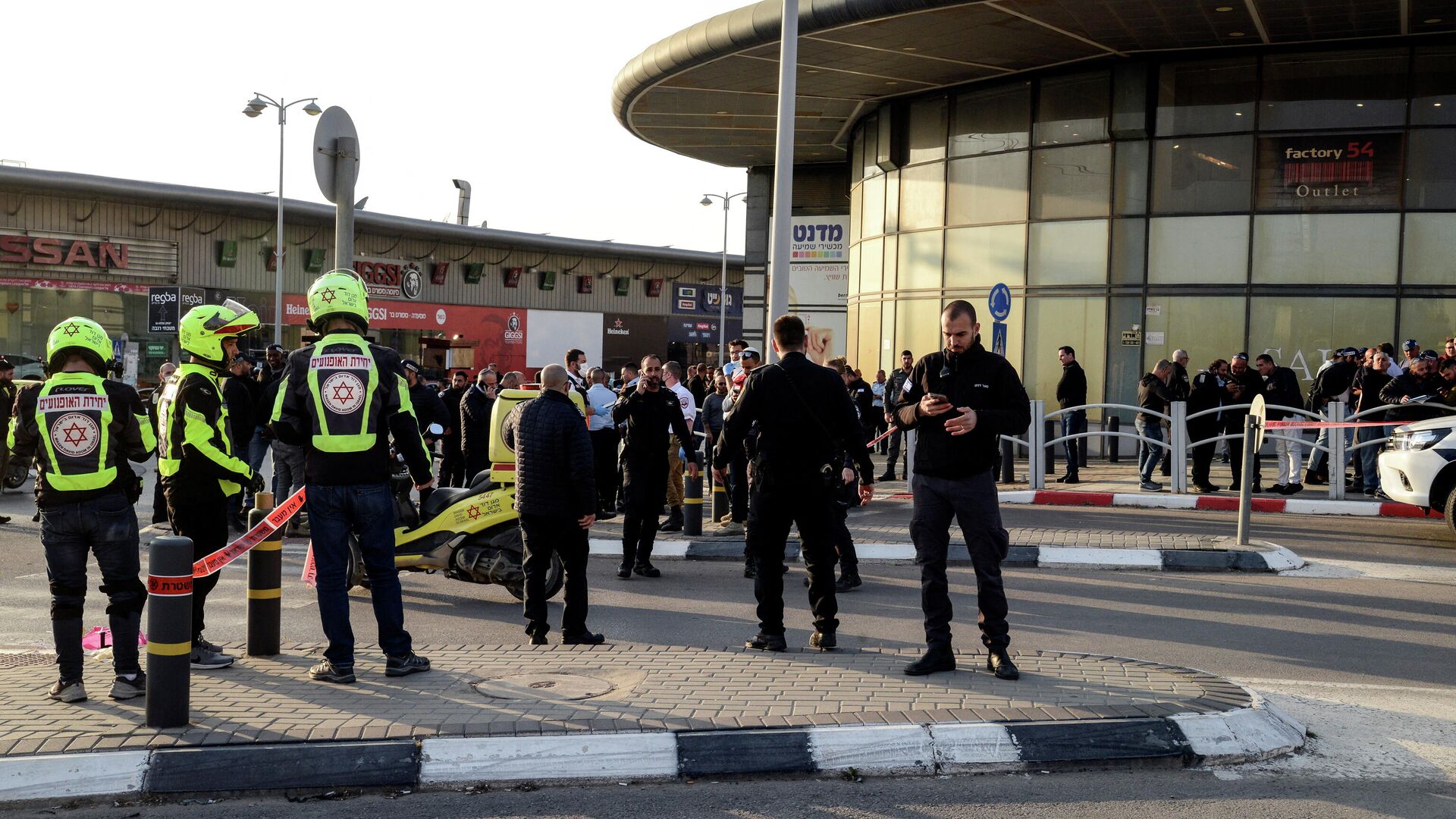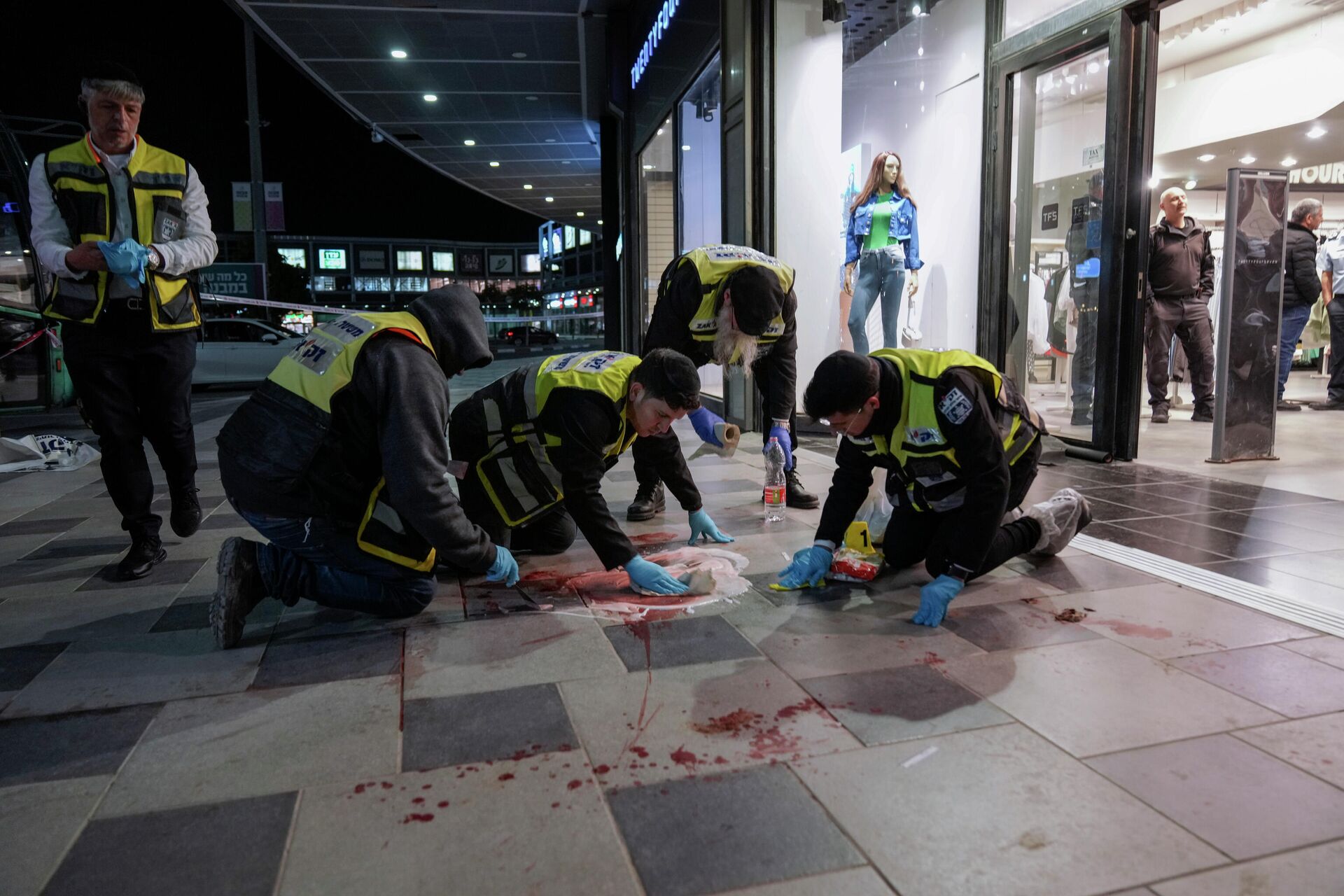https://sputnikglobe.com/20220323/beersheba-stabbing-attack-whats-behind-the-deadly-incident-in-the-southern-israeli-city-1094108826.html
Beersheba Stabbing Attack: What’s Behind the Deadly Incident in the Southern Israeli City?
Beersheba Stabbing Attack: What’s Behind the Deadly Incident in the Southern Israeli City?
Sputnik International
Mohammed Ghaleb Abou Al Qiyan was once a teacher before he established a cell that supported Daesh*. In 2016, when he was sentenced to four years in prison, he... 23.03.2022, Sputnik International
2022-03-23T08:42+0000
2022-03-23T08:42+0000
2023-01-15T17:25+0000
beersheba
radicalization
stabbing attack
israel
https://cdn1.img.sputnikglobe.com/img/07e6/03/17/1094108684_0:160:3073:1888_1920x0_80_0_0_761e9ab9cf1cc27bd8a894ee36047bf7.jpg
Israel is used to terror. Since the establishment of the state in 1948, it has seen hundreds of such acts, performed by Palestinian militants. The radicalisation of Israeli Arabs has been relatively uncommon, but Tuesday evening added yet another name to that list of terrorists.It was shortly after 4:00 p.m. local time when Mohammed Ghaleb Abou Al Qiyan, a 34-year-old resident of the Bedouin town of Al Hura, arrived at a Beersheba gas station in southern Israel to murder Israelis. His first victim was a middle-aged woman, who was stabbed to death. From there, he continued to the nearby shopping mall, rammed a man in his sixties with his car, and proceeded to murder two more civilians, injuring two others.Al Qiyan himself was subsequently shot by a bus driver who was present at the scene. It was reported that the assailant eventually died of his wounds.Radicalisation in PrisonsThe event stirred an uproar among Israelis; local media dedicated much of its coverage to the reasons that could have pushed a former teacher to commit such an atrocious act of terror.It turns out that Al Qiyan was well-known to Israel's security apparatus. In 2015, the state filed a lawsuit against him for participating in "a forbidden gathering", for having ties to criminal circles and for attempts to leave Israel for the sake of conducting an "unlawful act".Later it was also revealed that Al Qiyan had ties to Daesh*. He set up a secret cell comprised of Israeli Arabs that aimed at infiltrating Syria, where they would fight in the ranks of the deadly terrorist group. He was serving as the spiritual leader of the cell and preaching in mosques in support of the extremists.A year after his arrest, in 2016, Al Qiyan finally heard his verdict. He was sentenced to four years in prison. He expressed regret about his deeds and promised not to return to terror, but two years down the line, he broke these promises.Israeli decision makers and members of the security apparatus have long been aware that such prisoners tend to become even more radical in Israeli prisons. Normally, inmates are segregated according to their affiliations. They are allowed various types of literature and access to mass media. When they are released, many return to extremism.Al Qiyan probably went through a similar process. But according to Israeli media, his radical ideas weren’t the only thing that pushed the 34-year-old to extremism. Another factor, they say, could have been the neglect of the Bedouin community, which makes up some 3.5 percent of Israel's total population.Years of NeglectThroughout the years, Israeli media outlets have been ringing the alarm bell over the dire situation of the country's Bedouins.In 2018 it was reported that the unemployment rate in that sector was much higher when compared to the rest of the country: 8 percent among men and over 10 percent among women.The proportion of high school graduates was also relatively low, at only 48.1 percent, versus nearly 70 percent among the general public.Poverty, high crime rates and a lack of basic services have also been problematic, but Israel has been largely neglecting these issues. It is not that the Jewish state hasn't tried to address these challenges. In recent years, Israeli governments have invested more than $340 million into the Bedouin community. The current coalition has also committed to pour more than $400 million into that sector, but years of neglect have shown that the gaps were far too wide to bridge.Some Israeli politicians have already acknowledged that problem. Last night, Deputy Minister of Defence Alon Schuster said that Tuesday's attack was a direct outcome of the neglect of the country's Bedouins.Due to the outcry that followed shortly after, he was forced to apologise and say that his words were taken out of context, but the neglect of Israel's Bedouins is an issue that the country will need to address, sooner rather than later.*Daesh (aka ISIL/Islamic state etc.) is a terror group banned in Russia and many other states
beersheba
israel
Sputnik International
feedback@sputniknews.com
+74956456601
MIA „Rossiya Segodnya“
2022
News
en_EN
Sputnik International
feedback@sputniknews.com
+74956456601
MIA „Rossiya Segodnya“
Sputnik International
feedback@sputniknews.com
+74956456601
MIA „Rossiya Segodnya“
beersheba, radicalization, stabbing attack, israel
beersheba, radicalization, stabbing attack, israel
Beersheba Stabbing Attack: What’s Behind the Deadly Incident in the Southern Israeli City?
08:42 GMT 23.03.2022 (Updated: 17:25 GMT 15.01.2023) Mohammed Ghaleb Abou Al Qiyan was once a teacher before he established a cell that supported Daesh*. In 2016, when he was sentenced to four years in prison, he stated that he regretted his past deeds, but two years after his release he resorted to terrorism again.
Israel is used to terror. Since the establishment of the state in 1948, it has seen hundreds of such acts, performed by Palestinian militants. The radicalisation of Israeli Arabs has been relatively uncommon, but Tuesday evening added yet another name to that list of terrorists.
It was shortly after 4:00 p.m. local time when Mohammed Ghaleb Abou Al Qiyan, a 34-year-old resident of the Bedouin town of Al Hura, arrived at a Beersheba gas station in southern Israel to murder Israelis. His first victim was a middle-aged woman, who was stabbed to death. From there, he continued to the nearby shopping mall, rammed a man in his sixties with his car, and proceeded to
murder two more civilians, injuring two others.
Al Qiyan himself was subsequently shot by a bus driver who was present at the scene. It was reported that the assailant eventually died of his wounds.
Radicalisation in Prisons
The event stirred an uproar among Israelis; local media dedicated much of its coverage to the reasons that could have pushed a former teacher to commit such an atrocious act of terror.
It turns out that Al Qiyan was well-known to Israel's security apparatus. In 2015, the state filed a lawsuit against him for participating in "a forbidden gathering", for having ties to criminal circles and for attempts to leave Israel for the sake of conducting an "unlawful act".
Later it was also revealed that
Al Qiyan had ties to Daesh*. He set up a secret cell comprised of Israeli Arabs that aimed at infiltrating Syria, where they would fight in the ranks of the deadly terrorist group. He was serving as the spiritual leader of the cell and preaching in mosques in support of the extremists.
A year after his arrest, in 2016, Al Qiyan finally heard his verdict. He was sentenced to four years in prison. He expressed regret about his deeds and promised not to return to terror, but two years down the line,
he broke these promises.
Israeli decision makers and members of the security apparatus have long been aware that such prisoners
tend to become even more radical in Israeli prisons. Normally, inmates are segregated according to their affiliations. They are allowed various types of literature and access to mass media. When they are released, many return to extremism.
Al Qiyan probably went through a similar process. But according to Israeli media, his radical ideas weren’t the only thing that pushed the 34-year-old to extremism. Another factor, they say, could have been the neglect of the Bedouin community, which makes up some 3.5 percent of Israel's total population.
Throughout the years, Israeli media outlets have been ringing the alarm bell over the dire situation of the country's Bedouins.
In 2018 it was reported that the unemployment rate in that sector was much higher when compared to the rest of the country: 8 percent among men and over 10 percent among women.
The proportion of high school graduates was also relatively low, at only 48.1 percent, versus nearly 70 percent among the general public.
Poverty, high crime rates and a lack of basic services have also been problematic, but Israel has been largely neglecting these issues. It is not that the Jewish state hasn't tried to address these challenges. In recent years, Israeli governments have invested more than
$340 million into the Bedouin community. The current coalition has also committed to pour more than $400 million into that sector, but years of neglect have shown that the gaps were far too wide to bridge.
Some Israeli politicians have already acknowledged that problem. Last night, Deputy Minister of Defence Alon Schuster said that Tuesday's attack was a direct outcome of the neglect of the country's Bedouins.
Due to the outcry that followed shortly after, he was forced to
apologise and say that his words were taken out of context, but the neglect of Israel's Bedouins is an issue that the country will need to address, sooner rather than later.
*Daesh (aka ISIL/Islamic state etc.) is a terror group banned in Russia and many other states


